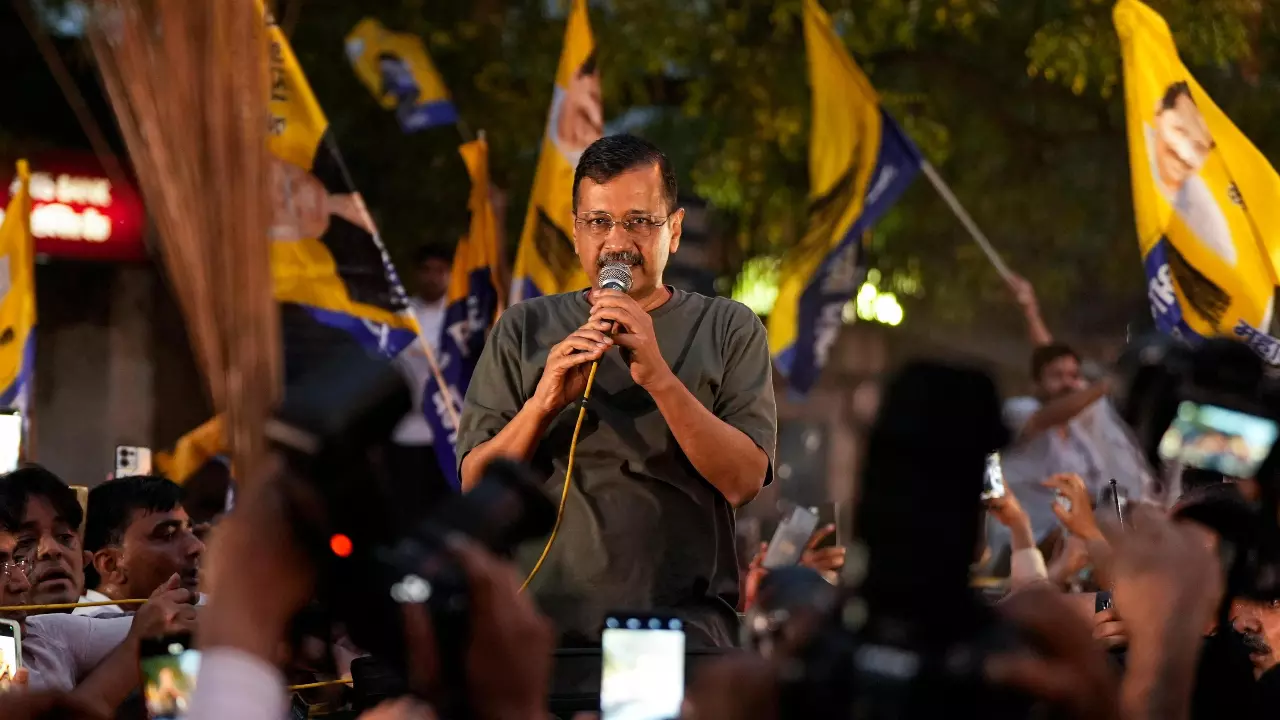Kejriwal’s bail forces PM Modi to battle for firewall around ED
There are people who believe Kejriwal was allowed to be granted bail to create a rival to Rahul Gandhi among INDIA bloc parties

With Delhi Chief Minister Arvind Kejriwal being released by the order of Supreme Court on bail from Tihar jail on Friday (May 10), though on an interim basis, stakes in the current electoral battle in not only Delhi but also beyond its confines have heightened quite a bit.
No surprise then that Prime Minister Narendra Modi tried to dispel the impression that Enforcement Directorate (ED) was unduly after his government’s political and electoral rivals like Kejriwal.
Modi was campaigning in far-off Odisha when the court order came in Delhi. During a roadshow he turned to a TV channel reporter to say, among other things, that only 3 per cent of cases taken up by the ED happened to be against political leaders, while many more were taking to task bureaucrats, businessmen, drug operators, land and sand mafia and myriad other offenders.
“Yet, huge piles of currency notes have been recovered in West Bengal and Jharkhand in ED raids (on politicos’ premises) and these notes proved hard to be quantified even with the help of note-counting machines,” Modi remarked in the short and impromptu interview.
PM evades specifics
Significantly, the prime minister did not mention the Delhi Excise Policy case which is before the court with Kejriwal as an accused. There can be two reasons for the PM to not go into the specifics of the case. First, it is sub judice. Second, no cash has been recovered in the case, which has been dragging for over a year, since Delhi’s Deputy Chief Minister Manish Sisodia was arrested in February 2023. This is so despite the courts repeatedly asking the ED to work out and show a money trail or recovery of cash or assets allegedly generated by tweaking the policy.
In the absence of these, Kejriwal and his Aam Aadmi Party (AAP) have been accusing the Centre of political vendetta before elections and trying to weaken the challenge that AAP can pose to the BJP in Delhi, Punjab, Haryana, and Gujarat. This was also the refrain when Kejriwal came out of jail on Friday evening. He called upon his cheering supporters gathered outside the jail to “rise and stem the tide of dictatorship (under Modi)”.
Bail raises expectations
His 21-day bail is to last until June 1. It is mainly meant to enable him to participate in the electioneering. But this has come in his case alone, while other accused, such as former Jharkhand Chief Minister Hemant Soren, are still in confinement in other cases filed by the ED.
Not only those accused in similar cases of suspected money-laundering but also Kejriwal's co-accused in the excise policy case continue to languish in jail. Their pleas of the cases being of a political nature have so far gone unheeded, but the relief given to Kejriwal by the court has also raised expectations about a possible release on bail of similar other prisoners awaiting trial.
Anyway, Kejriwal is being seen as an exception, and since he has got reprieve from the top court, attention has gone to its likely impact on the current Lok Sabha polls. There are politically informed people in Delhi who believe that Kejriwal’s bail could be possible because there was deep resentment among Delhi’s tradesmen belonging to his Bania caste ever since his arrest.
Wary of antagonising traders
They believe it to be so despite the fact that the ED vehemently opposed the bail granted to Kejriwal by the Supreme Court, and further point out that the Delhi Lt Governor’s move to activate the National Investigation Agency (NIA) against Kejriwal in another more serious case has so far shown no action.
These indications being cited to show the Union government’s veiled willingness for the release of Kejriwal during the polls are also backed by the argument that at least three Lok Sabha constituencies of the total of seven in Delhi have strong traders’ lobby. These parliamentary seats are Chandni Chowk, West Delhi and North-West Delhi. The BJP candidates in these seats are Praveen Khandelwal, Kamaljeet Sehrawat, and Yogender Chandolia, respectively. All three of them could have suffered significant loss of votes due to traders’ ire, which could well have reflected in votes, had Kejriwal’s detention continued.
Creating rivalry in INDIA block
Another point is also being made to argue that a Kejriwal free to campaign suits the BJP more than the Delhi chief minister being kept in jail through the run-up to the May 25 polls in Delhi. And it is based on the theory that the sheer drive, aggression, and flamboyance of Kejriwal could well diminish and take away some of the primacy and limelight that Congress’ bet Rahul Gandhi has come to hog among the INDIA bloc parties or among the leaders of these parties.
In the BJP’s assessment of the present electoral scene, and also that of the section of media supporting the ruling party, Rahul needs a challenge from within the alliance of opposition parties. So, the more warring heads on the rival side, the better.
Anyway, this may well be a BJP strategy or part of some plan, but it does not look to be free of a tinge of fantasy, at least at this stage when polls in Delhi are only a couple of weeks away.
